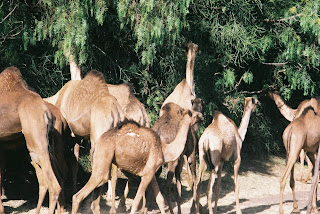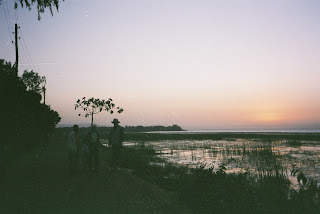The alarm pulled us awake at a too early 5:50, so we could have breakfast and be ready for pick-up at 7:00. We dressed, ate a cold breakfast, and found we still had time to play for half an hour before the 4WD with driver and guide arrived at about 7:15 to begin our southern trip to Arba Minch.
We slipped onto the ring road and shortly were on the major highway that leads east towards Djibouti. Since Ethiopian-Eritrean relations are strained (to put it mildly), all exports and imports travel through Djibouti, a small former French colony nestled on the Red Sea to the north of Somalia and south-east of Eritrea. So this is a very busy highway, with many trucks carrying goods to and from the port. It is a good highway and quite wide, but being an Ethiopian highway, one must still contend with donkey carts and pedestrians along the shoulder. At least the highway does have a fairly wide, fairly good shoulder, so there is space for the donkey carts and pedestrians to travel without generally impeding the flow of highway traffic. But from time to time the former straggle onto the portion of highway reserved for the latter, occasioning swift braking action, honking, and swerving.
As we travelled along, we saw some nomadic herders with a troop of camels. We stopped and Paulos asked if we could photograph them. They agreed, for a mere 10 birr, I believe.





We followed this highway for about 70 km, then turned south onto the main road heading towards Shashemene and Awassa, our day's destination. The countryside we passed through was open and flat, dotted with acacia and other trees, with hills rising in the distance on either side. We saw evidence of more industry and machines than we had in any of the places we'd visited on our northern tour: several combines, one tractor, a few large factory buildings, and acres upon acres of greenhouses. Our guide, Paulos, told us these produced flowers for export to the European market.
All this co-exists with the same basic, subsistence agricultural system we'd seen in the north: a man bearing a single-blade plough over his shoulder, of the sort an ox or cow would pull; herds of cows, goats and sheep grazing in fields or along the side of roads; small plots of land surrounded by bamboo-pole or llve cactus fences; traditional tukuls surrounded by numerous neat round stacks of teff straw. Even the combined grain would be hand-bagged, it seems, for the country lacks any system of mass grain storage or transportation.
We stopped for tea at 10:30 at a town about an hour's drive after turning onto the southerly highway. The day was hot and the 4WD appeared to be an older vehicle: bumpy and rattly and not very comfortable for riding in for long hours. Every time the driver got above a certain speed the whole vehicle would vibrate; Laoye said it was because the driveshaft was unbalanced. But tea-time gave us a chance to stretch our legs. Giggles promptly discovered the restaurant cats and attempted to pet them, but again they were too wary.
Another two and a half hours of driving took us to Shashemene, a major crossroads city. Here the main highway continues south to Awassa and on, all the way to the Kenyan border, while a secondary road turns west, then south again to follow the Rift Valley down towards Arba Minch. We lunched at Shashemene, then drove the final 20 km to Awassa and found our hotel.
It was a basic hotel on the shores of Lake Awassa, one of the Rift Valley lakes. Each room had the standard two twin beds, but these rooms were in rows like townhouses, down a little road a short walk from the reception area. We were to learn that this was the standard pattern for hotels in the south (at least the ones we stayed in). The hotel had very nice grounds; many trees, shrubs, and flowers, and they came complete with two kinds of monkeys (one small, one larger with black and white colouration. l have to find out what kinds they are).
Two of the smaller monkeys we saw were mamas with babies clinging to their bellies. We also saw ducks sitting in the treetops, a tree full of storks, and several kingfishers diving into the water and hovering after a dive, almost like hummingbirds. We spent a while lounging along the lakeshore, then Paulos took Laolao, Giggles and me into town where I visited the internet café and Giggles played solitaire with Paulos on a different computer in a different room. Next was a sunset walk along the lakeshore, watching the marabou storks, kingfishers, and other passersby.
A poor woman was selling popcorn at 1 birr (11 cents) a bag; I bought one bag for some nibblies. As dusk fell, we made our way to a neighbouring hotel for supper, then back to our own for bed, with the notice that we were to be up for breakfast at 7:00 for a long day's drive the next day down to Arba Minch.
(Continue to 27 December: A hot and dusty, rattly day)










No comments:
Post a Comment